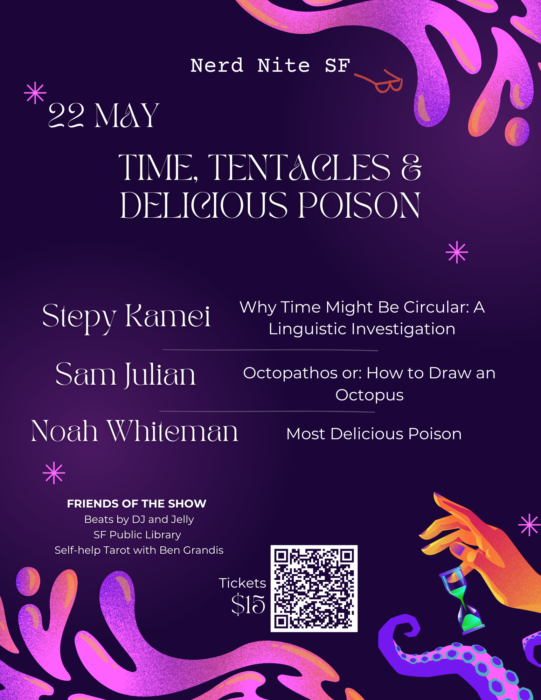
Wednesday, May 22nd
7pm Doors
Tickets: $15
“Why time might be circular: A Linguistic Investigation”
By: Stepy Kamei
Using the text of Alice in Wonderland as a reference point, follow Stepy down the rabbit hole to investigate the very real possibility that time might actually be happening all at once. However, we can only perceive it as going forwards or backwards because of linguistic constraints. But … what would happen if we broke free from the constraints of language?
Stepy Kamei is a writer and podcast host who is equally passionate about three things: poetry, linguistics, and educating everyone within earshot about both of those things.
“Octopathos or, How to Draw an Octopus”
By: Sam Julian
Octopus bodies are about as far from human biology as it’s possible to be, and yet people still find them cute. How does this happen, and how can it be exploited to get people to care about ocean conservation? Cartoonist Sam Santos Julian will share his experience designing cartoon octopuses in his graphic novel Octopolis, how the principles of cartooning influence empathy in the reader, and —of course— how to draw an octopus.
Sam Santos Julian is a cartoonist and the creator of Octopolis, a graphic novel that he self-published this year. Sam studied Creative Writing at Stanford, and has worked as a game and product designer. Originally from San Diego, Sam now lives in Daly City with his partner and dog. He volunteers as a SCUBA diver at the SF Aquarium of the Bay, where he gets to feed the wolf eels, giant sea bass, and of course, the octopus.
“Most Delicious Poison”
By: Noah Whiteman
Scratch beneath the surface of a coffee bean, a red pepper flake, a poppy seed, a mold spore, a foxglove leaf, a magic-mushroom cap, a marijuana bud, or an apple seed, and we find a bevy of strange chemicals. We use these to greet our days (caffeine), titillate our tongues (capsaicin), recover from surgery (opioids), cure infections (penicillin), mend our hearts (digoxin), bend our minds (psilocybin), calm our nerves (CBD), and even kill our enemies (cyanide). But why do plants and fungi produce such chemicals? And how did we come to use and abuse some of them?
Noah Whiteman is an evolutionary biologist at the University of California, Berkeley, where he is Professor of Integrative Biology and of Molecular and Cell Biology. At Berkeley, he is also affiliated with the Helen Wills Neuroscience Institute, Center for Computational Biology, Museum of Vertebrate Zoology, Jepson and University Herbaria, and Essig Museum of Entomology. He received a Guggenheim Fellowship in 2020 to write Most Delicious Poison.
We Are Delighted to Welcome Back Friends of the Show:
Beats by DJ and Jelly
SF Public Library
Self-help Tarot with Ben Grandis